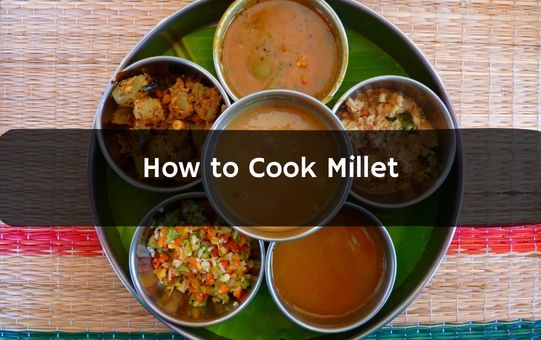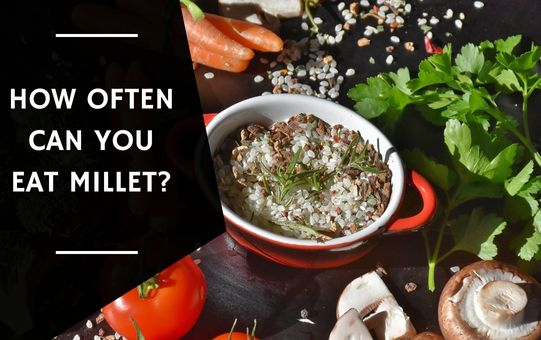Millet is a wholesome grain that has been consumed for centuries, but how often can you eat Millet?
There is no set recommendation for how frequently millet should be consumed, but including it in a variety of grains can provide a number of health benefits. It is generally advised to consume a variety of grains, including millet, as part of a healthy and balanced diet. Always consult a healthcare professional prior to making significant dietary changes.
This article discusses the health benefits of millet and suggests ways to incorporate it into your diet.
Contents
Why often can you eat millet matter?
Eating a variety of grains, including millet, is important for maintaining a balanced and healthy diet. Each type of grain has its own unique nutritional profile, and including a variety in your diet can help to ensure that you are getting all the nutrients your body needs.
Millet is a good source of nutrients, including protein, fiber, and several minerals such as iron, magnesium, and zinc. It is also high in antioxidants, which can help to protect against chronic diseases such as cancer and heart disease. In addition, millet is high in fiber, which can help to support healthy digestion and prevent constipation.
Eating millet regularly can provide these health benefits, but it’s important to keep in mind that no single food can provide all the nutrients your body needs. It’s important to maintain a balanced diet that includes a variety of foods from all food groups, including grains, fruits, vegetables, lean proteins, and healthy fats. This will help to ensure that you are getting all the nutrients your body needs to function optimally.
Read Also: Can You Eat Millet Every Day?
What is Millet?
Millet is a small, round grain that belongs to the grass family. It is one of the oldest cultivated grains and has been a staple food in many parts of the world for centuries. There are several types of millet, including pearl millet, finger millet, and proso millet.
Millet is a good source of nutrients, including protein, fiber, and several minerals such as iron, magnesium, and zinc. It is also gluten-free, making it a good option for those with celiac disease or gluten sensitivity.
How to Cook Millet?
To cook millet, follow these steps:
- Rinse the millet: Place the millet in a fine-mesh strainer and rinse it under cold running water. This will help to remove any dirt or debris.
- Combine the millet and liquid: In a saucepan, combine the rinsed millet with the liquid of your choice (water, broth, or a combination of both). The general ratio is 1:2.5, meaning for every 1 cup of millet, you will need 2.5 cups of liquid.
- Bring the mixture to a boil: Place the saucepan over medium-high heat and bring the mixture to a boil.
- Reduce the heat and simmer: Once the mixture has reached a boil, reduce the heat to low and let it simmer, covered, for about 20-25 minutes.
- Fluff and serve: Once the millet has finished cooking, fluff it with a fork and serve it as a side dish or use it in your favorite recipes.
Note: You can also cook millet in a rice cooker or slow cooker. Follow the manufacturer’s instructions for the specific cooking time and liquid ratio.

can you eat millet raw?
Millet is generally not recommended to be eaten raw as it can be difficult to digest and may contain harmful bacteria. Raw millet may also have a bitter taste and a hard texture, which can be unpleasant to eat.
It is recommended to cook millet before consuming it, as this can help to improve its digestibility and make it more palatable. Millet can be cooked using various methods, such as boiling, steaming, or roasting. Once cooked, it can be used in a variety of dishes, such as porridges, salads, and stews.
Benefits of Millet
Millet has a number of health benefits that make it a good addition to your diet.
- It is a good source of nutrients and can help to support heart health, lower cholesterol levels, and regulate blood sugar levels.
- Millet is also high in antioxidants, which can help to protect against chronic diseases such as cancer and heart disease.
- In addition, millet is high in fiber, which can help to support healthy digestion and prevent constipation.
Incorporating Millet into Your Diet
There are many ways to incorporate millet into your diet. It can be cooked and eaten as a side dish, mixed into soups and stews, or used as a base for salads.
Millet can also be ground into flour and used in baking or as a thickener for sauces and soups. If you’re new to millet, try adding it to your diet gradually and see how your body responds.
It is always a good idea to talk to a healthcare professional before making any significant changes to your diet.
Read Also: Can You Eat Millet Flakes Raw?
Conclusion
Millet is a nutritious grain that can be a great addition to a balanced and healthy diet. There is no set recommendation for how often you should eat millet, but including it as part of a variety of grains can provide a number of health benefits.
Whether you’re new to millet or have been eating it for years, it’s always a good idea to consult with a healthcare professional before making any significant changes to your diet.
FAQs | Often Can You Eat Millet
Here are a few FAQs related to How often can you eat millet:
Is Millet A Good Choice For A Healthy Diet?
Millet is a good choice for a healthy diet as it is a good source of nutrients and can help to support heart health, lower cholesterol levels, and regulate blood sugar levels. It is also high in antioxidants and fiber, which can help to protect against chronic diseases and support healthy digestion.
Can I Eat Millet If I Have Celiac Disease Or Gluten Sensitivity?
Yes, millet is a gluten-free grain, making it a good option for those with celiac disease or gluten sensitivity.
How Do I Incorporate Millet Into My Diet?
There are many ways to incorporate millet into your diet. It can be cooked and eaten as a side dish, mixed into soups and stews, or used as a base for salads. Millet can also be ground into flour and used in baking or as a thickener for sauces and soups.
Can I Eat Millet Every Day?
There is no set recommendation for how often you should eat millet, as it will depend on your individual nutritional needs and preferences. It is generally recommended to include a variety of grains in your diet, including millet, as part of a balanced and healthy diet.
Should I Consult With A Healthcare Professional Before Making Any Changes To My Diet?
It is always a good idea to consult with a healthcare professional before making any significant changes to your diet. They can provide personalized recommendations based on your individual nutritional needs and health goals.

